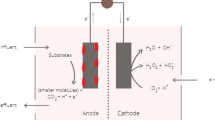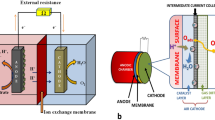Abstract
Biotechnology is constantly explored to develop methods for wastewater treatment to have a clean environment. Discharge of untreated wastewaters in the soil and water environment is the major cause of environmental pollution in soil and surface and groundwater bodies. Current wastewater treatment technologies are not sufficient to meet the ever-growing demands due to rapid industrialization and population growth, and they are also energy-consuming and cost-intensive. Therefore, it is necessary to develop an energy-efficient treatment method. The rise in global energy demand is projected to increase by 37% by 2040. As the conventional energy sources are also depleting at a fast rate, it is necessary to adopt renewable energy to meet the demands of future energy scenario. Microbial fuel cell (MFC) is a technology in which electricity is generated from wastewater using microorganism as a biocatalyst, simultaneously achieving wastewater treatment. In this system, microorganism mediates the direct conversion of chemical energy stored in biodegradable organic matter of wastewater into electrical energy. Many researchers have developed a variety of MFC-centered hybrid wastewater treatment plants at a pilot scale, for the treatment of wastewater from different industries such as dye, brewery, and dairy industries, domestic wastewater, and landfill leachate. Irrespective of the potential of MFC as a renewable energy source and its wide applicability for wastewater treatment, the technique is not yet established successfully for field applications. Low-energy performance and excessive internal resistance are the limiting factors in its practical application. Researchers have performed multiple strategic attempts to minimize these factors by developing efficient reactor designs for minimizing internal resistance, stacking multiple reactors into one enlarge system (modularization). Modularization is one of the common strategies followed by researchers for pilot-scale MFC setup. This prevents the unnecessary distance between anode and cathode and enhances COD removal rate. Also, using various forms of electrodes such as carbon brushes, nickel foam, etc. to provide large surface area and modification of electrodes using nanomaterials have shown power density enhancement. This chapter discusses the potential applications and practical limitations of MFC for its effectiveness in wastewater treatment and contaminant removal and energy generation at bench and pilot scale.
Access this chapter
Tax calculation will be finalised at checkout
Purchases are for personal use only
Similar content being viewed by others
References
Ahn Y, Logan BE (2010) Effectiveness of domestic wastewater treatment using microbial fuel cells at ambient and mesophilic temperatures. Bioresour Technol 101:469–475. https://doi.org/10.1016/j.biortech.2009.07.039
Akman D, Cirik K, Ozdemir S, Ozkaya B, Cinar O (2013) Bioelectricity generation in continuously-fed microbial fuel cell: effects of anode electrode material and hydraulic retention time. Bioresour Technol 149:459–464. https://doi.org/10.1016/J.BIORTECH.2013.09.102
Alatraktchi FA, Zhang Y, Angelidaki I (2014) Nanomodification of the electrodes in microbial fuel cell: impact of nanoparticle density on electricity production and microbial community. Appl Energy 116:216–222. https://doi.org/10.1016/j.apenergy.2013.11.058
Cheng S, Logan BE (2011) Increasing power generation for scaling up single-chamber air cathode microbial fuel cells. Bioresour Technol 102(6):4468–4473. https://doi.org/10.1016/j.biortech.2010.12.104
Cheng S, Liu H, Logan BE (2006) Power densities using different cathode catalysts (Pt and CoTMPP) and polymer binders (Nafion and PTFE) in single chamber microbial fuel cells. Environ Sci Technol 40:364–369. https://doi.org/10.1021/es0512071
Clauwaert P, Mulenga S, Aelterman P, Verstraete W (2009) Litre-scale microbial fuel cells operated in a complete loop. Appl Microbiol Biotechnol 83:241–247. https://doi.org/10.1007/s00253-009-1876-0
Dong Y, Qu Y, He W et al (2015) A 90-liter stackable baffled microbial fuel cell for brewery wastewater treatment based on energy self-sufficient mode. Bioresour Technol 195:66–72. https://doi.org/10.1016/j.biortech.2015.06.026
Fan YZ, Hu HQ, Liu H (2007) Enhanced Coulombic efficiency and power density of air-cathode microbial fuel cells with an improved cell configuration. J Power Sources 171:348–354. https://doi.org/10.1016/j.jpowsour.2007.06.220
Fan Y, Han S-K, Liu H (2012) Improved performance of CEA microbial fuel cells with increased reactor size. Energy Environ Sci 5:8273–8280. https://doi.org/10.1039/c2ee21964f
Feng Y, He W, Liu J, Wang X, Qu YRN (2014) A horizontal plug flow and stackable pilot microbial fuel cell for municipal wastewater treatment. Bioresour Technol 156:132–138. https://doi.org/10.1016/j.biortech.2013.12.104
Ge Z, Zhang F, Grimaud J, Hurst J, He Z (2013) Long-term investigation of microbial fuel cells treating primary sludge or digested sludge. Bioresour Technol 136:509–514. https://doi.org/10.1016/j.biortech.2013.03.016
Ge Z, He Z, Ren ZJ, Zeeman G, Saakes M, Sleutels TH, Buisman CJ (2016) Long-term performance of a 200 liter modularized microbial fuel cell system treating municipal wastewater: treatment, energy, and cost. Environ Sci Water Res Technol 2(2):274–281. https://doi.org/10.1039/C6EW00020G
Ghadge AN, Jadhav DA, Ghangrekar MM (2016) Wastewater treatment in pilot-scale microbial fuel cell using multielectrode assembly with ceramic separator suitable for field application. Environ Prog Sustain Energy 35:1809–1817. https://doi.org/10.1002/ep.12403
Habermann W, Pommer EH (1991) Biological fuel cells with sulphide storage capacity. Appl Microbiol Biotechnol 35:128–133. https://doi.org/10.1007/BF00180650
Haeger A, Forrestal C, Xu P, Ren ZJ (2014) High performance spiral wound microbial fuel cell with hydraulic characterization. Bioresour Technol 174:287–293. https://doi.org/10.1016/j.biortech.2014.09.153
Heidrich ES, Edwards SR, Dolfing J, Cotterill SE, Curtis TP (2014) Performance of a pilot scale microbial electrolysis cell fed on domestic wastewater at ambient temperatures for a 12 month period. Bioresour Technol 173:87–95. https://doi.org/10.1016/j.biortech.2014.09.083
Hiegemann H, Herzer D, Nettmann E, Lubken M, Schulte P, Schmelz G, Hoffmann SG, Wichern M (2016) An integrated 45 L pilot microbial fuel cell system at a full scale wastewater treatment plant. Bioresour Technol 218:115–122. https://doi.org/10.1016/j.biortech.2016.06.052
Heilmann J, Logan BE (2006) Production of electricity from proteins using a microbial fuel cell. Water Environ Res 78:531–537. https://doi.org/10.2175/106143005X73046
Jiang D, Curtis M, Troop E, Scheible K, McGrath J, Hu B, Suib S, Raymond D, Li B (2011) A pilot-scale study on utilizing multi-anode/cathode microbial fuel cells (MAC MFCs) to enhance the power production in wastewater treatment. Int J Hydrogen Energy 36:876–884. https://doi.org/10.1016/J.IJHYDENE.2010.08.074
Kim Y, Logan BE (2013) Microbial desalination cells for energy production and desalination. Desalination 308:122–130. https://doi.org/10.1016/j.desal.2012.07.022
Kim JR, Premier GC, Hawkes FR et al (2010) Modular tubular microbial fuel cells for energy recovery during sucrose wastewater treatment at low organic loading rate. Bioresour Technol 101:1190–1198. https://doi.org/10.1016/j.biortech.2009.09.023
Liu H, Logan BE (2004) Electricity generation using an air-cathode single chamber microbial fuel cell in the presence and absence of a proton exchange membrane. Environ Sci Technol 38(14):4040–4046. https://doi.org/10.1021/es0499344
Liu Y, Liu H, Wang C, Hou SX, Yang N (2013) Sustainable energy recovery in wastewater treatment by microbial fuel cells: stable power generation with nitrogen doped graphene cathode. Environ Sci Technol 47(23):13889–13895. https://doi.org/10.1021/es4032216
Logan BE (2008) Microbial fuel cells. John Wiley and Sons, Hoboken
Logan BE, Cheng S, Watson V, Estadt G (2007) Graphite fiber brush anodes for increased power production in air-cathode microbial fuel cells. Environ Sci Technol 41(9):3341–3346. https://doi.org/10.1021/es062644y
Lu M, Chen S, Babanova S et al (2017) Long-term performance of a 20-L continuous flow microbial fuel cell for treatment of brewery wastewater. J Power Sources 356:274–287. https://doi.org/10.1016/j.jpowsour.2017.03.132
Oh ST, Kim JR, Premier GC, Lee TH, Kim C, Sloan WT (2010) Sustainable waste water treatment: how might MFC contribute? Biotech Adv 28:871–881. https://doi.org/10.1016/j.biotechadv.2010.07.008
Park Y, Nguyen VK, Park S, Yu J, Lee T (2018) Effects of anode spacing and flow rate on energy recovery of flat-panel air-cathode microbial fuel cells using domestic wastewater. Bioresour Technol 258:57–63. https://doi.org/10.1016/j.biortech.2018.02.097
Rabaey K, Clauwaert P, Aelterman P, Verstraete W (2005) Tubular microbial fuel cells for efficient electricity generation. Environ Sci Technol 39:8077–8082. https://doi.org/10.1021/es050986i
Ren S, Xia X, Yuan L, Liang P, Huang X (2013) Enhancing charge harvest from microbial fuel cells by controlling the charging and discharging frequency of capacitors. Bioresour Technol 146:812–815. https://doi.org/10.1016/j.biortech.2013.08.055
Rhoads A, Beyenal H, Lewandowski Z (2005) Microbial fuel cell using anaerobic respiration as an anodic reaction and biomineralized manganese as a cathodic reactant. Environ Sci Technol 39:4666–4671. https://doi.org/10.1021/es048386r
Sonawane JM, Gupta A, Ghosh PC (2013) Multi-electrode microbial fuel cell (MEMFC): a close analysis towards large scale system architecture. Int J Hydrog Energy 38:5106–5114. https://doi.org/10.1016/j.ijhydene.2013.02.030
Waller MG, Trabold TA (2013) Review of microbial fuel cells for wastewater treatment: large-scale applications, future needs and current research gaps. ASME. International Conference on Fuel Cell Science, Engineering and Technology, ASME 2013 11th International Conference on Fuel Cell Science, Eng. and Technol: V001T01A011. doi:10.1115/FuelCell2013-18185.
Wei J, Liang P, Huang X (2011) Recent progress in electrodes for microbial fuel cells. Bioresour Technol 102(20):9335–9344. https://doi.org/10.1016/j.biortech.2011.07.019
Wu C, Liu XW, Li WW, Sheng GP, Zang GL, Cheng YY (2012) A white-rot fungus is used as a biocathode to improve electricity production of a microbial fuel cell. Appl Energy 98:594–596. https://doi.org/10.1016/j.apenergy.2012.02.058
Wu S, Li H, Zhou X et al (2016) A novel pilot-scale stacked microbial fuel cell for efficient electricity generation and wastewater treatment. Water Res 98:396–403. https://doi.org/10.1016/j.watres.2016.04.043
Yazdi H, Gaviria LA, Ren ZJ (2015) Pluggable microbial fuel cell stacks for septic wastewater treatment and electricity production. Bioresour Technol 180:258–263. https://doi.org/10.1016/j.biortech.2014.12.100
Zhang F, Jacobson KS, Torres P et al (2010) Effects of anolyte recirculation rates and catholytes on electricity generation in a litre-scale upflow microbial fuel cell. Energy Environ Sci 3:1347. https://doi.org/10.1039/c001201g
Zhang F, Ge Z, Grimaud J, Hurst J, He Z (2013a) Long-term performance of liter-scale microbial fuel cells treating primary effluent installed in a municipal wastewater treatment facility. Environ Sci Technol 47(9):4941–4948. https://doi.org/10.1021/es400631r
Zhang F, Ge Z, Grimaud J et al (2013b) In situ investigation of tubular microbial fuel cells deployed in an aeration tank at a municipal wastewater treatment plant. Bioresour Technol 136:316–321. https://doi.org/10.1016/j.biortech.2013.02.107
Zhuang L, Yuan Y, Wang Y, Zhou S (2012a) Long-term evaluation of a 10-liter serpentine-type microbial fuel cell stack treating brewery wastewater. Bioresour Technol 123:406–412. https://doi.org/10.1016/j.biortech.2012.07.038
Zhuang L, Zheng Y, Zhou S et al (2012b) Scalable microbial fuel cell (MFC) stack for continuous real wastewater treatment. Bioresour Technol 106:82–88. https://doi.org/10.1016/j.biortech.2011.11.019
Zuo K, Cai J, Liang S et al (2014) A ten liter stacked microbial desalination cell packed with mixed ion-exchange resins for secondary effluent desalination. Environ Sci Technol 48:9917–9924. https://doi.org/10.1021/es502075r
Author information
Authors and Affiliations
Editor information
Editors and Affiliations
Rights and permissions
Copyright information
© 2020 Springer Nature Switzerland AG
About this chapter
Cite this chapter
Geetanjali, Agrahari, R., Kumar, S., Rani, R. (2020). Microbial Fuel Cell-Based Process for Wastewater Treatment and Power Generation. In: Gothandam, K., Ranjan, S., Dasgupta, N., Lichtfouse, E. (eds) Environmental Biotechnology Vol. 1. Environmental Chemistry for a Sustainable World, vol 44. Springer, Cham. https://doi.org/10.1007/978-3-030-38192-9_10
Download citation
DOI: https://doi.org/10.1007/978-3-030-38192-9_10
Published:
Publisher Name: Springer, Cham
Print ISBN: 978-3-030-38191-2
Online ISBN: 978-3-030-38192-9
eBook Packages: Earth and Environmental ScienceEarth and Environmental Science (R0)




